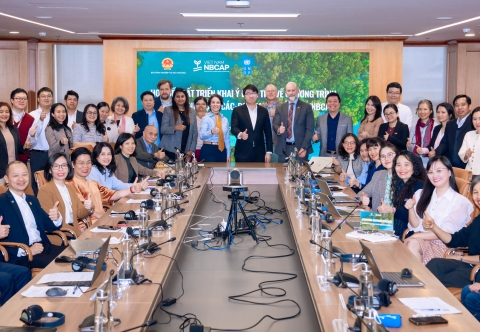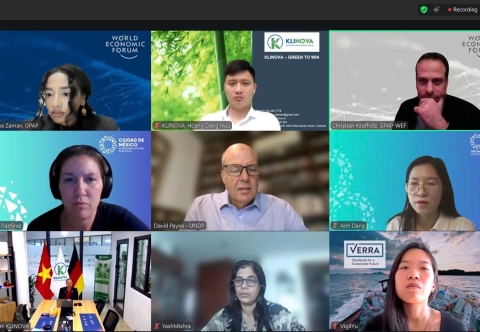At the end of 2024, Lithuania officially submitted its Biennial Transparency Report (BTR1) under the Paris Agreement, demonstrating a strong commitment to climate transparency and global responsibility in addressing climate change.
The report underwent an in-country technical review in Vilnius from May 5 to May 9, 2025, as part of the UNFCCC transparency framework. During this review, KLINOVA’s expert Hue Nguyen, a UNFCCC Reviewer for Climate Change Reports on Projection, participated as a member of the technical review team. They contributed to assessing the report’s consistency, clarity, and compliance with the reporting guidelines of the Paris Agreement.
Ms. Nguyen Thi Minh Hue (third from left), International Reviewer of the UNFCCC for Climate Change and Greenhouse Gas Inventory since January 2022.
Lithuania participates in the European Union’s joint Nationally Determined Contribution (NDC), which aims for at least a 55% reduction in greenhouse gas emissions by 2030 compared to 1990 levels. Within this framework, Lithuania is accountable for reducing emissions by 21% in sectors outside the EU Emissions Trading System (EU ETS), which includes transport, agriculture, buildings, and waste. As of 2022, the country had already achieved a 61% reduction in emissions from 1990 levels, driven by a shift towards lower-emission sectors, technological advancements, and improvements in energy efficiency.
However, the transport sector still faces significant challenges. While emissions from the energy and industrial sectors have decreased steadily, emissions from the transport sector have actually increased. This rise is largely attributed to an aging vehicle fleet, continued reliance on fossil fuels, and the slow adoption of cleaner mobility options. There is an urgent need to accelerate investments in low-emission transport, electric vehicle charging infrastructure, and behavioral changes in mobility choices.
.jpg)
In agriculture, emissions from livestock have decreased due to changes in herd sizes, while emissions from crop production have increased due to a higher usage of nitrogen fertilizers. Although there are signs of a slight slowdown in emissions due to price fluctuations and adjustments in farming practices, the sector needs targeted strategies to balance productivity with emission reductions.
Forests continue to play a vital role as carbon sinks; however, their absorption capacity has been declining since 2011 due to forest aging and changes in land use. This underscores the necessity to enhance forest regeneration programs, promote sustainable forest management practices, and increase the use of bio-based construction materials that can store carbon for longer periods.
Beyond its domestic efforts, Lithuania provided over USD 13 million in climate support to developing countries between 2021 and 2022. This support, which included financial contributions, technology transfer, and capacity building, focused on Eastern Partnership countries such as Armenia, Georgia, and Moldova, particularly in areas like renewable energy (notably solar power), environmental governance, and waste management improvements. These initiatives reaffirm that Lithuania’s climate action extends beyond its borders, contributing to shared regional resilience.
.jpg)
International experts of the United Nations during a working session in Lithuania, May 2025.
Overall, BTR1 indicates that Lithuania is on a positive trajectory toward meeting its climate commitments. However, achieving the 2030 target will require a sustained acceleration in clean mobility, low-carbon agriculture, and forest management. Continued progress will depend on green investments, effective market-supporting policies, and active engagement from the government, businesses, and communities in advancing a just and sustainable transition.
Thuy Linh
 Meeting to propose the implementation of the Letter of Intent for the National Green Carbon Action Partnership Program (NBCAP)
Meeting to propose the implementation of the Letter of Intent for the National Green Carbon Action Partnership Program (NBCAP)
 Online Workshop on the Financing Roadmap for Plastic Action to 2030: Mobilizing USD 8.5 Billion for Viet Nam’s Circular Economy
Online Workshop on the Financing Roadmap for Plastic Action to 2030: Mobilizing USD 8.5 Billion for Viet Nam’s Circular Economy